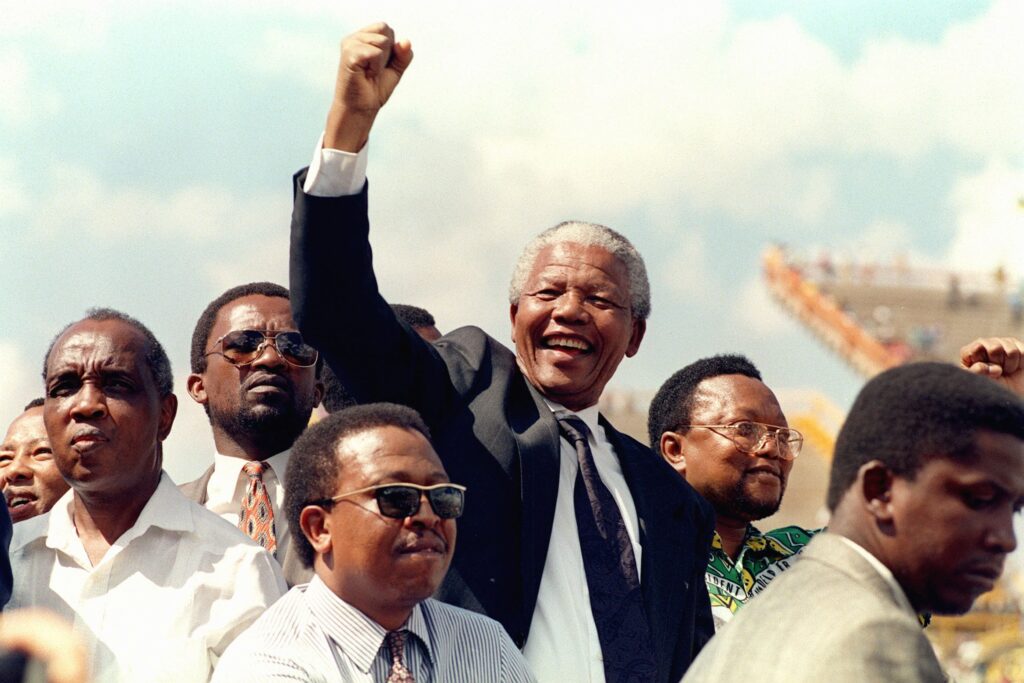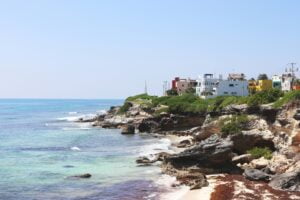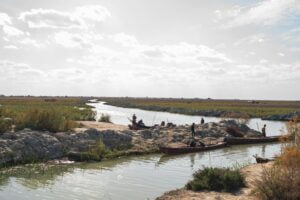
Nelson Mandela’s unparalleled legacy is not only etched in the annals of history through evocative Nelson Mandela quotes but also through his indomitable spirit that continued to fight against apartheid from behind bars. His extraordinary journey from a prisoner to a president encapsulates a pivotal chapter in the world’s ongoing struggle for justice and equality. The significance of Mandela’s contributions cannot be overstated, as they played a critical role in dismantling the oppressive regime of apartheid in South Africa, showcasing his resilience and unwavering commitment to his ideals.
This article delves into the remarkable story of how Nelson Mandela, even from the confines of his prison cell, orchestrated a campaign that would eventually lead to the eradication of racial segregation in South Africa. Beginning with a background on apartheid and early resistance efforts, it will trace Mandela’s early life, his integral role in the African National Congress (ANC), and how, even from prison, he became a symbol of resistance and hope. Key events leading to the end of apartheid will be explored, followed by an examination of the impact and legacy of Mandela’s efforts, not forgetting the role of nelson mandela university in preserving his ethos. Through this narrative, readers will gain insight into the power of resilience, leadership, and unwavering commitment to justice.
Background on Apartheid and Early Resistance
What is Apartheid?
Apartheid, translated from Afrikaans as “apartness,” was a policy that enforced racial segregation and white supremacy in South Africa throughout the 20th century. Introduced by the National Party in 1948, apartheid laws classified South Africans by racial groups, dictating where they could live, work, and the type of education they could receive. This system significantly disadvantaged the non-white majority, fostering widespread resistance both domestically and internationally.
Early Forms of Resistance
Resistance to apartheid began early and was multifaceted, involving mass protests, strikes, and sabotage. The African National Congress (ANC), initially formed in 1912 to advocate for black South Africans’ rights, became a central figure in the struggle. The ANC, alongside other groups, organized significant resistance movements, including the Defiance Campaign in 1952 and the Freedom Charter in 1955, which proclaimed “South Africa belongs to all who live in it, black or white.” These efforts were met with severe repression, notably the Sharpeville Massacre in 1960, where police killed 69 unarmed protesters.
Formation of ANC
The ANC was established in 1912 as the South African Native National Congress, aiming to unite African people against colonial and later apartheid oppression. Over the decades, it evolved from a moderate organization advocating dialogue to a radical movement under the influence of its Youth League, adopting more confrontational strategies like the 1952 Defiance Campaign. Key figures such as Nelson Mandela, Oliver Tambo, and Walter Sisulu were instrumental in these transformations, steering the ANC towards more assertive resistance tactics, including the formation of its military wing, Umkhonto we Sizwe, in 1961.
Mandela’s Early Life and Role in ANC
Early Life and Education
Nelson Mandela was born on July 18, 1918, in the village of Mvezo in Transkei, South Africa. His birth name, Rolihlahla, meaning “troublemaker,” foreshadowed his future role in challenging apartheid. He began his education at a local primary school in Qunu where his teacher gave him the English name “Nelson”. Mandela’s early education continued at Clarkebury Boarding Institute and later at Healdtown, a Wesleyan secondary school. He pursued higher education at the University College of Fort Hare but was expelled for participating in a student protest.
Involvement in ANC
Mandela’s political involvement intensified in 1944 when he joined the African National Congress (ANC) and helped to establish the ANC Youth League. His leadership in the Defiance Campaign of 1952, advocating non-violent resistance, marked a significant escalation in his activism. However, the Sharpeville Massacre in 1960, where peaceful protesters were killed, profoundly impacted Mandela, leading him to endorse armed resistance. He played a pivotal role in founding Umkhonto we Sizwe, the armed wing of the ANC, signaling a strategic shift from peaceful protests to armed resistance.
Arrest and Imprisonment
Mandela’s commitment to overthrowing apartheid led to multiple arrests. In 1962, he was arrested and sentenced to five years in prison for incitement and leaving the country without a passport. His incarceration extended when he was sentenced to life imprisonment in 1964 during the Rivonia Trial, where he made his famous “Speech from the Dock“. Mandela spent 27 years in prison, becoming a global symbol of resistance and an advocate for racial equality. His release in 1990 was a monumental event, paving the way for the dismantling of apartheid.
Resistance from Prison
Nelson Mandela’s influence from prison was profound, shaping the anti-apartheid movement despite his confinement. His ability to communicate with the outside world was severely restricted, yet he managed to send messages and writings that fueled the resistance. Mandela’s statements, smuggled out of Robben Island, underscored the necessity of unity and persistent struggle against apartheid, rallying support both domestically and internationally.
International Support and Sanctions
The global response to apartheid, particularly after the publicized atrocities like the Soweto uprising, was significant. International bodies such as the United Nations imposed sanctions and embargoes, pressuring the South African government. The UN Security Council’s mandatory arms embargo in 1977 and subsequent economic sanctions highlighted the increasing international isolation of South Africa, which was crucial in de-legitimizing the apartheid regime.
Role of ANC and Other Groups
The African National Congress (ANC), under Mandela’s symbolic leadership, continued to promote both nonviolent resistance and armed struggle. The ANC’s activities were complemented by the efforts of other groups and international allies. Inside South Africa, movements like the United Democratic Front, formed in 1983, played a critical role in mobilizing community resistance against apartheid policies. These collective efforts were instrumental in maintaining momentum against apartheid during Mandela’s imprisonment.
Key Events Leading to the End of Apartheid
1985 Conditional Offer and Rejection
In 1985, State President P. W. Botha extended a conditional release to Nelson Mandela, which required him to renounce violence as a means of change. Mandela, through his daughter Zindzi at a rally in Soweto, declined the offer, emphasizing that true negotiations could only occur between free individuals. His refusal was a pivotal moment, reinforcing his commitment to the ANC’s cause and setting a precedent for future negotiations.
The Fall of the Berlin Wall
The fall of the Berlin Wall in 1989 marked a significant global shift, influencing the political landscape in South Africa. The collapse of the Soviet Union alleviated fears of communism, providing South African President F.W. de Klerk the necessary support to initiate reforms. This event indirectly facilitated the unbanning of political parties and the release of political prisoners, setting the stage for the end of apartheid.
Formal Negotiations and Mandela’s Release
Formal negotiations towards ending apartheid began earnestly following Mandela’s release from prison in 1990. The negotiations were initially jeopardized by the Sebokeng massacre, but resumed after a crucial meeting between Mandela and President de Klerk. These talks were essential in dismantling apartheid’s legal framework and paving the way for a new democratic South Africa.
Impact and Legacy of Mandela’s Efforts
Post-Apartheid Reconciliation
Nelson Mandela’s presidency marked a significant shift towards healing and reconciliation in South Africa. He established the Truth and Reconciliation Commission, which was pivotal in addressing the atrocities of apartheid and fostering a sense of justice and closure for the victims. This commission was an integral part of Mandela’s strategy to unite a nation divided by decades of racial tension and injustice.
Mandela’s Presidency
During his term, Mandela focused on transforming South Africa into a country that epitomized unity and equality. His policies aimed at alleviating poverty and reducing the stark inequalities left by the apartheid regime. Initiatives like the Reconstruction and Development Programme were crucial in improving living standards and providing essential services to the previously marginalized communities. Mandela’s leadership was not only transformative on a policy level but also symbolically powerful, promoting a new national identity based on diversity and mutual respect.
Lasting Impact on Global Movements
Mandela’s influence extends far beyond the borders of South Africa. His life and political career continue to inspire global movements for justice and equality. His approach to leadership and reconciliation has been studied and admired by many around the world, making him a symbol of resistance and peace. Mandela’s legacy teaches valuable lessons in how to combat oppression and foster societal peace and justice, resonating with various international human rights campaigns.
Conclusion
Nelson Mandela’s enduring legacy, as explored throughout this article, stands as a testament to the power of unwavering commitment and resilience in the face of systemic oppression. His journey from incarceration to the presidential office not only dismantled the oppressive regime of apartheid but also set a beacon of hope for oppressed populations globally. By highlighting Mandela’s strategic approach to dismantling apartheid from behind bars, his leadership within the African National Congress, and his pivotal role in advocating for racial equality, we are reminded of the impactful role collaborative and persistent resistance can play in achieving justice.
The implications of Mandela’s efforts reach far beyond the historical confines of South Africa, serving as a foundational pillar for contemporary movements for social justice and equality worldwide. His presidency and the post-apartheid reconciliation process he championed demonstrate the critical importance of leadership in healing a nation divided. As we reflect on Mandela’s contribution to the fight against apartheid and his broader impact on the world, it’s clear that his legacy continues to inspire and challenge us to pursue a more equitable and just society for all.
FAQs
1. Why was Nelson Mandela imprisoned and what was its significance? Nelson Mandela was incarcerated for 26 years, primarily on Robben Island, due to his opposition to apartheid. Apartheid was a system of institutionalized racial segregation and discrimination enforced by the South African government from 1948 to 1994. His imprisonment highlighted the severity of racial injustices and garnered international support against apartheid.
2. What contributions did Nelson Mandela make to South Africa? Nelson Mandela’s most notable contribution was his role in ending apartheid after being released from prison in 1990. He worked alongside then-State President F. W. de Klerk to dismantle the apartheid regime, which led to establishing a peaceful, racially integrated society. He also championed human rights globally, emphasizing that all humans are born with equal dignity and rights.
3. What were Nelson Mandela’s views on apartheid? Nelson Mandela was a staunch opponent of both white and black domination. He aspired to create a democratic and free society where all individuals could coexist in harmony and have equal opportunities. This vision was something he dedicated his life to achieving and hoped to see realized.
4. Who was Nelson Mandela and why is he considered significant? Nelson Mandela was South Africa’s first democratically elected president from 1994 to 1999 and is globally revered for his dedication to peace, negotiation, and reconciliation. As an anti-apartheid revolutionary, political leader, and philanthropist, Mandela’s profound love for children and commitment to social justice have made him an enduring symbol of hope and resilience.







